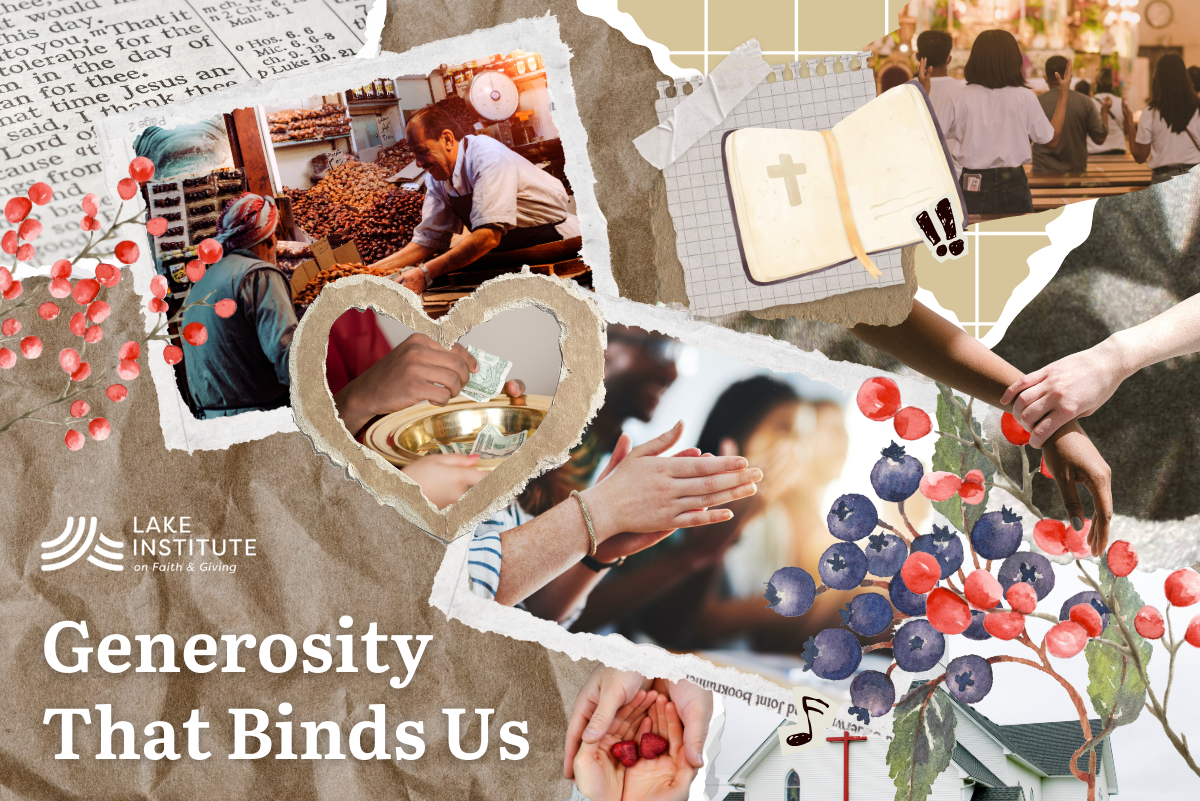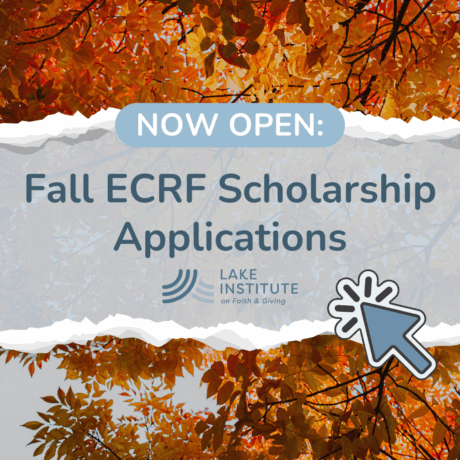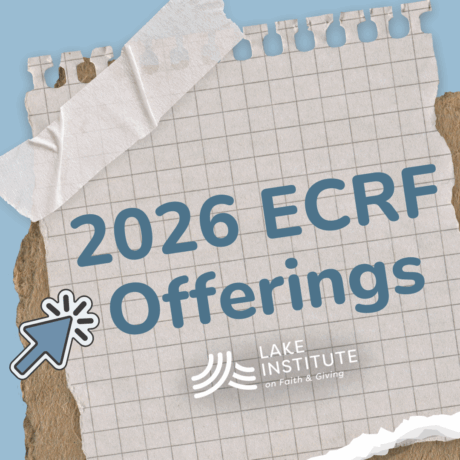Generosity That Binds Us
Generosity That Binds Us
Welcoming Elizabeth Le’anani Coffee, Lake’s Managing Director
Elizabeth brings a rich background in storytelling, community engagement, and philanthropic scholarship. As Director of Storytelling at the H. E. Butt Foundation, she led narrative change initiatives across San Antonio, creating collaborative media, convening dialogue-based cohorts, and elevating community voices through storytelling that fostered deeper understanding and equity. Elizabeth previously worked with Lake as a research associate, engaging with American patterns of giving and gathering for religious causes.
We’re thrilled to welcome Elizabeth back into the Lake family, bringing her visionary leadership, deep compassion, and narrative wisdom to her role as Managing Director.
Elizabeth Le’anani Coffee, Managing Director, Lake Institute on Faith & Giving
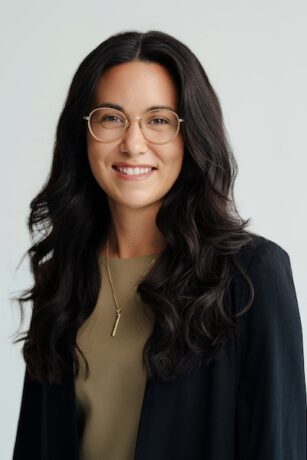
Looking Back: Generosity as Spiritual Practice
As I step into this new role at the Lake Institute on Faith & Giving, I do so with gratitude for the Institute’s twenty-year legacy of exploring the dynamic relationship between faith and giving. It is an honor to join a team and larger community committed to asking not just how we raise funds, but how generosity shapes who we are and how we live together.
For me, generosity has never been separate from faith. Growing up in my family, giving, whether it be time, presence, or finances, has always been an expression of stewarding of the things with which we have been entrusted. I grew up watching my parents and grandparents tithe and serve in our church, set extra plates at holiday tables for neighbors, and find local causes to which they made long-term financial and relational commitments. Giving was not an obligation; it was a spiritual manifestation of who we were and what we believed.
As a Hawaiian, I also carry a cultural inheritance that shapes the way I understand generosity. In Hawaiian tradition, giving is more than a transaction, it is an act of reciprocity. Gifts are understood to carry mana, the spiritual power of the giver and of the land. To refuse to give, or even to refuse to receive, was once considered not a neutral act but a rupture in community. The Hawaiian word ho‘okipa, often translated to “hospitality,” means so much more to me than its direct English translation. It means to be generous with everything you have and everything you are as a form of welcome.
These teachings remind me that generosity is not about what we give up. It is about how we are bound together in hope and abundance.
The Gift Beyond Transaction
For me, this resonates with my Hawaiian heritage and my Christian faith. Hawaiians speak of mana, the spiritual power carried in each gift. My faith proclaims that giving is an act of worship, a participation in God’s own self-giving. Both traditions – along with many other cultural and faith traditions – insist that generosity is not about loss. It is about belonging.
What if generosity was reclaimed in this way? Not only as a financial tool, but as a bridge between brokenness and belonging. Not only as a way to sustain institutions, but as a way to imagine new life, even amid decline.
That vision connects with the work of Lake Institute. To explore generosity is not only to analyze data or teach fundraising techniques (though both are essential). It is also to lift generosity out of narrow lanes and into the wide space of how we live together.
Looking Forward: Joining Lake’s Mission
I am especially eager to join Lake’s mission at this moment because I believe storytelling is one of the most faithful tools we have. Stories help us translate between lived experience and research findings. Data shows trends; stories make those trends human. Together, they confirm what communities already know: generosity is the connective tissue of our common life.
In this role, I hope to:
- Translate between research and lived story so communities see themselves reflected in the data.
- Refuse decline-only narratives, instead amplifying stories of hope and possibility.
- Speak honestly from spiritual and cultural rootedness so that generosity feels textured, not generic.
Lake Institute has always been a catalyst, convening leaders to think deeply about faith and giving. My commitment is to build on that legacy with faithful storytelling that binds us together in hope and abundance.
As I begin this chapter with the Lake Institute, I am eager to learn from you – scholars, practitioners, and faith leaders who are already living these questions. My conviction is simple but urgent: generosity is not about what we give up, but about how we are bound together in hope and abundance.
I look forward to joining you in exploring the many ways faith and giving continue to form not only our institutions, but also our lives, our communities, and our shared future.
Questions For Reflection
- If you believed every gift you gave carried part of yourself, how would it change your generosity?
- How might your faith community or organization practice generosity as belonging, not just survival?
- Where do you see stories of hope shaping the way your community gives today?
A Shared Vision of Generosity
By David P. King, PhD, Karen Lake Buttrey Director and Associate Professor, Philanthropic Studies, Lake Institute on Faith & Giving
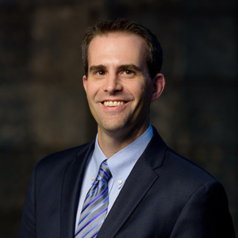
Elizabeth notes, “Generosity is not about what we give up, but about how we are bound together in hope and abundance.” That is precisely how we feel as she joins the Lake Institute team and helps us continue to expand our work in both breadth and depth.
Focused not only on individuals and institutions, Lake Institute also aims to encourage and shape communities. With the decline in social trust and increases in polarization and isolation, Elizabeth’s perspectives on generosity are essential for our current moment.
Having worked in religious organizations, philanthropic foundations, and networks focused on bridge-building and advocacy across local communities, Elizabeth comes with the expertise and experience to help catalyze networks, ask the big questions, and share these stories with our audiences.
Lake is excited to continue our work in research, education, and public conversation as we insist that a focus on faith and giving necessitates a rich exploration of a tapestry of generosity in communities and cultures. This is the essential hard work of acknowledging all the ways in which gifts and generosity are intertwined in our daily lives. It requires more than simply Lake Institute sharing stories, but rather encouraging others to find their voice and share their own stories of the power of generosity in today’s world.
As Elizabeth’s invitation indicates, we look forward to continuing these efforts together. And we are grateful for Elizabeth’s leadership in helping us find the way.
Fall ECRF Scholarship Applications Now Open
Applications for Lake Institute’s Executive Certificate in Religious Fundraising (ECRF) are now open! Thanks to the support of generous Lake Institute donors, we will grant 10 scholarships for this fall cycle.
Applications are open now through October 27, 2025. Applicants can expect to hear from our team about scholarship decisions by the end of November.
2026 ECRF Offerings & Schedule
The Executive Certificate in Religious Fundraising (ECRF) is an eight-week online or three-day in person religious fundraising course with a practical application project. It provides the research, tools, and customized training to meet the growing needs of leaders in religious communities and fundraisers of faith-based organizations.
Ready to attend? Check out our 2026 schedule and registration information by clicking the button below.
Subscribe
Insights is a bi-weekly e-newsletter for the religious community and fundraisers of faith-based organizations that provides:
- Reflections on important developments in the field of faith and giving
- Recommended books, studies and articles
- Upcoming Lake Institute events

